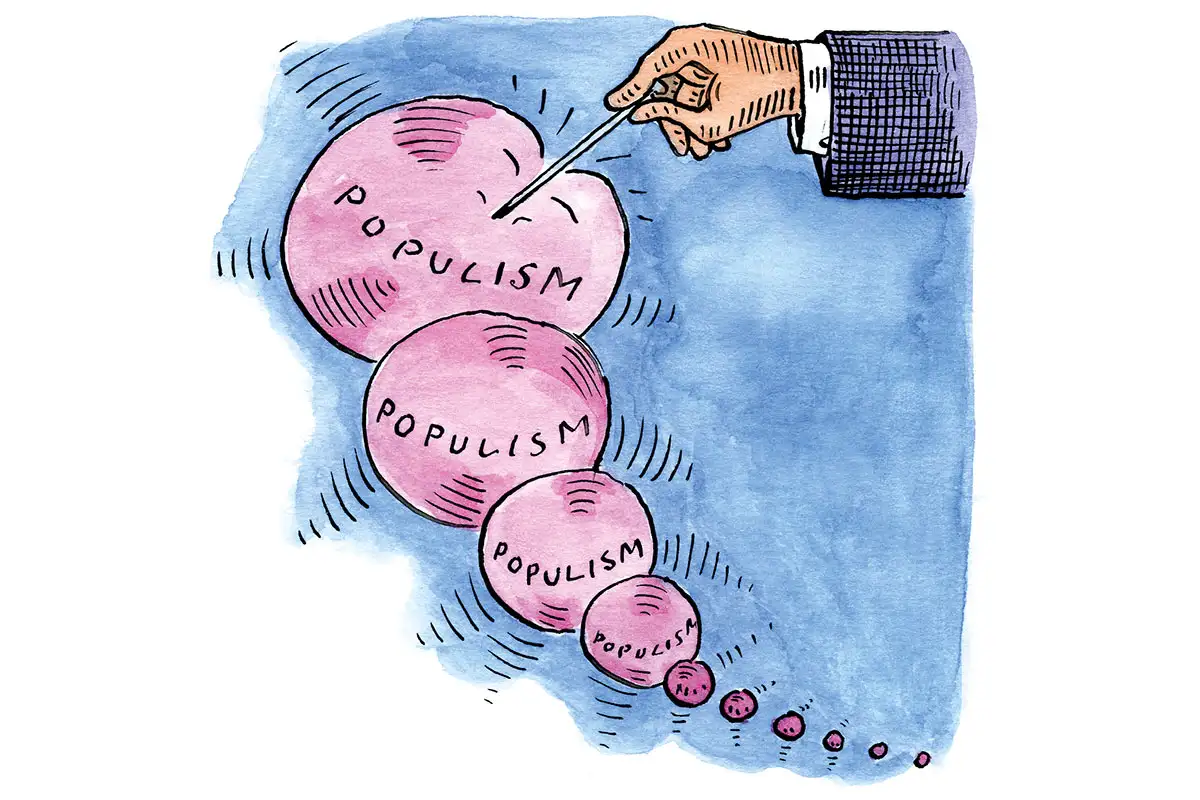
ZIMBABWE has a historical record of politics driven by populism, one that has impeded the nation's progress and created a festival of deferred destiny through allowing content free phenomena to occur. Populism is a political style aimed at appealing to ordinary people, often by making grand promises and proposing simple solutions to complex problems.
In Zimbabwe, politicians have used populism to incite supporters and distract them fromcritical issues affecting them.This crisis often rewards incompetence and bad leadership while negating genuine discourse.
However, moving towards sober and issue-based politics is necessary for Zimbabwe to achieve its potential.
The cost of populism
Populist politicians often take advantage of people's frustrations, promising to provide quick solutions to their problems. Zimbabwe has a high unemployment rate of 95%, weak economy, and significant social challenges, all of which make it a fertile ground for populist politicians.
However, this has often led politicians to resort to using divisive rhetoric, spreading false information through propaganda and using violence to advance their cause.
Typical is the sanctions excuse by ruling party elites. They blame their maladministration on sanctions and often defy logic by claiming that opposition is responsible.
It will be very unintelligent for anyone to ever claim that an opposition party in Zimbabwe has the power to determine the foreign policy of a sovereign nation in North America.
- Mr President, you missed the opportunity to be the veritable voice of conscience
- ED to commission new-look border post
- Zanu PF ready for congress
- EU slams Zim over delayed reforms
Keep Reading
The United States has a congress, foreign secretary and senate for that.
Furthermore, populism often leads to lack of accountability, with politicians making promises to gain support, only to abandon them after being elected.
In Zimbabwe, this has led to a cycle of conflict and violence, with citizens conditioned to expect little from their leaders. This cycle of unfulfilled promises and failed expectations has seen Zimbabwe's political discourse become increasingly polarised.
For example, in 2017 President Emmerson Mnangagwa promised free education by 2018 and raised hopes of many but here we are today and students are still protesting against tuition fees hikes.
Wait a second, he actually initiated a slash down of levy on primary and secondary education but the amount is less than ZW$30, which is less than the equivalent of US$0,50.
Hence one can conclude that the situation remained the same because the problem was over simplified.
The opposition is not spared from this cancer. The populist paradigm has created conditions necessary for personality cults to dominate discourse in the opposition.
This allows leaders to undermine systems and capture power while dividing people along lines of personality cults mistaken as factions. The saying goes as “urimunhu wani” — whose person, are you?
This wave is behind the much-anticipated rise of youth,a few who rise on the basis of content but as my fried Ntando Dumani said “they only have their youth to offer”.
Most youth in the opposition are riding on the generational renewal notion without interrogating the issues and this has successfully deceived their peers in the majority.
It is true that generational renewal is an initiative long over-due in our political discourse but it cannot be treated as an isolated conversation without complimenting the imperative need for competence.
Populism also takes advantage of truth and uses it to mainstream an agenda at the expense of other important issues. Our country is not only short of youthful leaders but also competent leaders.
These areyoung leaders with the capacity to implement reforms and help to democratise the country. Instead, we have young leaders who push their leaders’ populist agenda as a way to survive and avoid being axed.
The same goes in the women’s movement. The political playing field in Zimbabwe is patriarchaland women continue to be marginalised. Unfortunately, some of the women that are lucky enough to be selected to participate lack content.
Deferred destiny
This refers to the idea that a nation’s fate or potential is delayed or postponed for some reason or another.
The concept is often associated with the idea of unfulfilled potential or missed opportunities, and can be used to describe a situation where a person or group faces institutional or societal barriers to achieving their goals or realising their full potential.
The term has been used in a variety of settings, from literature to social justice activism, expression of frustration, hopelessness, or determination in the face of adversity.
Because of populism, Zimbabwe suffers deferred destiny, which is a barrier to several genuine issues that if prioritised the economy can perform better.
Most politicians take advantage of the crisis and grand stand, making promises but never paying attention to the critical debates. For example, among all political parties (from Zanu PF, CCC, MDC to Democratic Union of Zimbabwe) none of them articulate the national reconstruction debate and none of them are explicitly evaluating the country’s deep-rooted polarisation on identity, faith andaffiliations as impediments to peace and reconciliation.
They donot propose models to solving such. They have all ceased the ride on a wave of unemployment, hunger at surface level. While there are also others that grandstand and respond to other key issues for ticking the box without implementing them.
An example of this is the ruling party’s promise in 2018 to ensure equal access to energy. Fast forward to 2023, the country is facing an energy crisis, with Zimbabweans enduring power cuts of up to 18 hours.
Rural electrification now has a department at Zesa but very little progress is being made. The government uses this to lure voters.
Moving towards sober and issue-based politics
To move towards sober and issue-based politics, Zimbabwe needs a few critical changes. Firstly, leaders must abandon the divisive rhetoric and focus on unifying the country. Politicians should strive to respond to the needs and aspirations of the people, putting the interests of the nation first, rather than their narrow political interests.
Secondly, the media must play a critical role in promoting issue-based politics. The media should not be a mouthpiece for political propaganda but should instead provide balanced and accurate reporting. By doing so, the media can help to hold politicians accountable, expose corruption, and assist citizens in making informed decisions.
Finally, Zimbabwe needs to invest in civic education. This will require providing citizens with access to impartial information and developing their critical thinking skills. Civic education will enable citizens to better engage with public issues, appreciate the importance of accountability, and demand more of their leaders.
Lastly, Zimbabwe needs a social engineering tool.
In may spaces, I have engaged with fellow activists and thinkers. I have always argued that our politics is bad not because of anything apart from our mentality.
It is our mentality that normalises bad politics and puts us in condition of disregarding integrity.
We need a positive social engineering tool that inculcates progressive political thinking. Other countries have these, like Germany and the United States, the Obama Foundation, Mandela Washington fellowship and Fredrick Ebert Stiftung.
Because most African countries donot have such, the global north have exported them to us and sadly they low key advance an imperial idea. We learn governance from a view point of philosophies that work for them and not us exclusively.
South African leader, the late Oliver Reginald Tambo of the ANC advised that we should also learn from our enemies. For sure we should also learn the idea to create our own social engineering tools in order to fashion our discourse in the most progressive manner that builds our nation.
So, to deal with populism and move to sober politics let us be deliberate in creating progressive social engineering tools.
Conclusion
Zimbabwe has enormous potential but is currently being held back by its reliance on populist politics. Moving towards sober and issue-based politics will require significant changes in the political, media, and education system. However, if Zimbabwe can make these changes, it will lay the foundation for a brighter future.
Kanhenga is a public intellectual and leader of the Zimbabwe Human Rights Monitor Platform.






